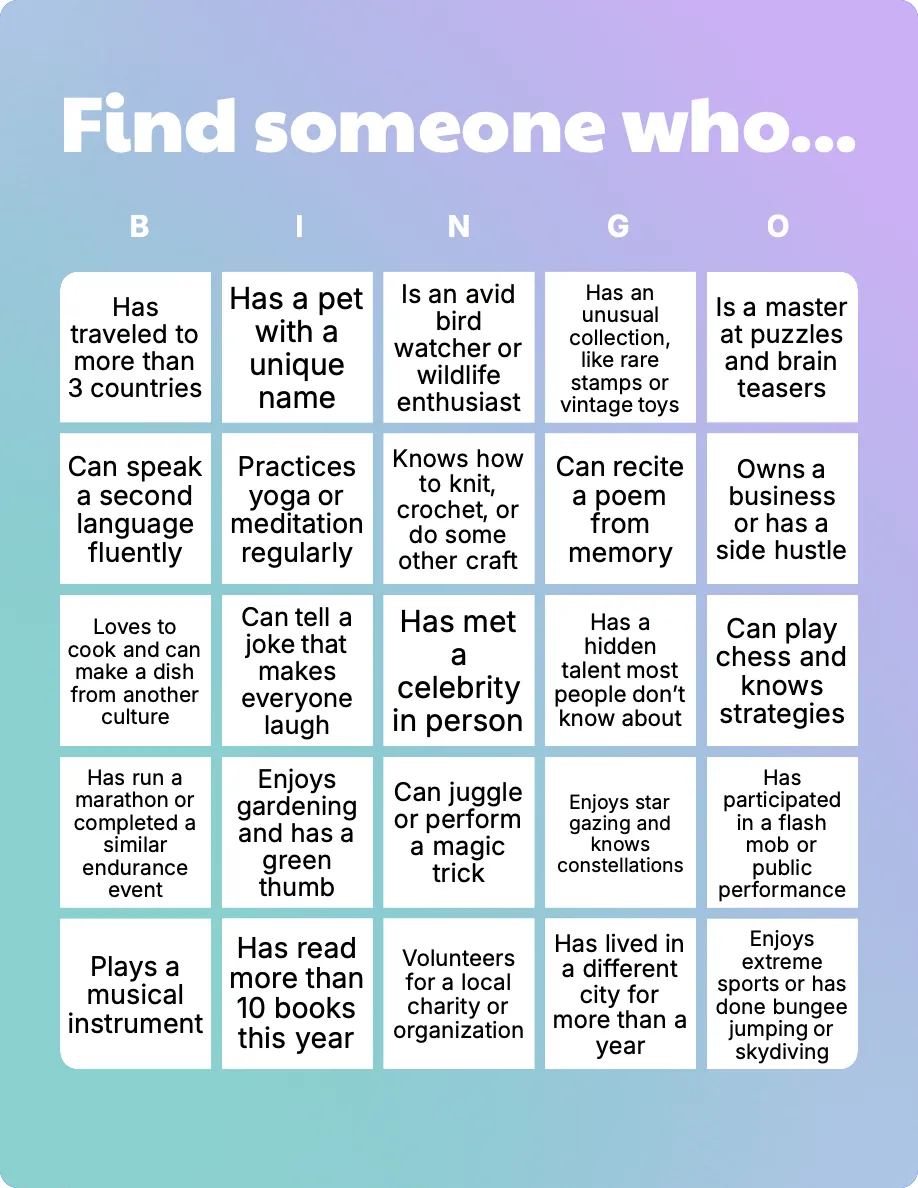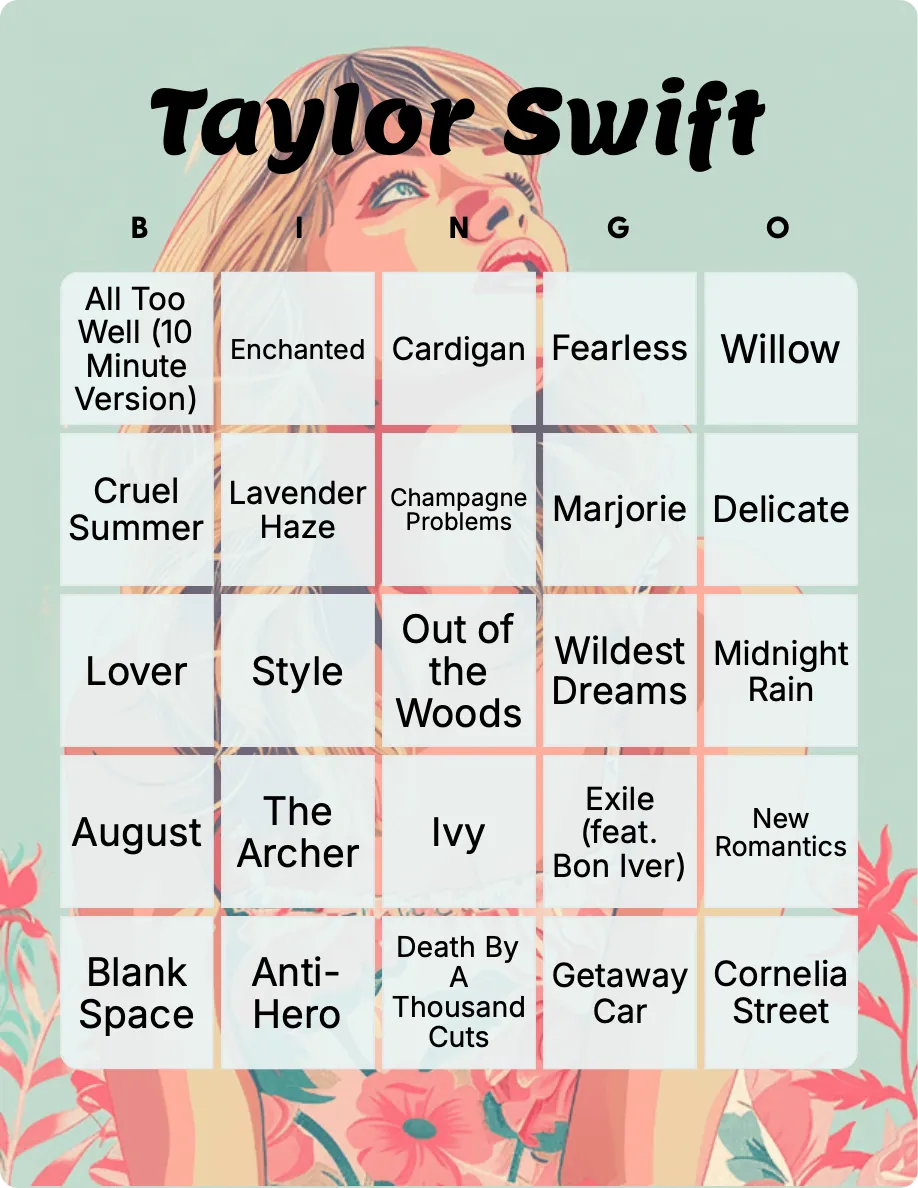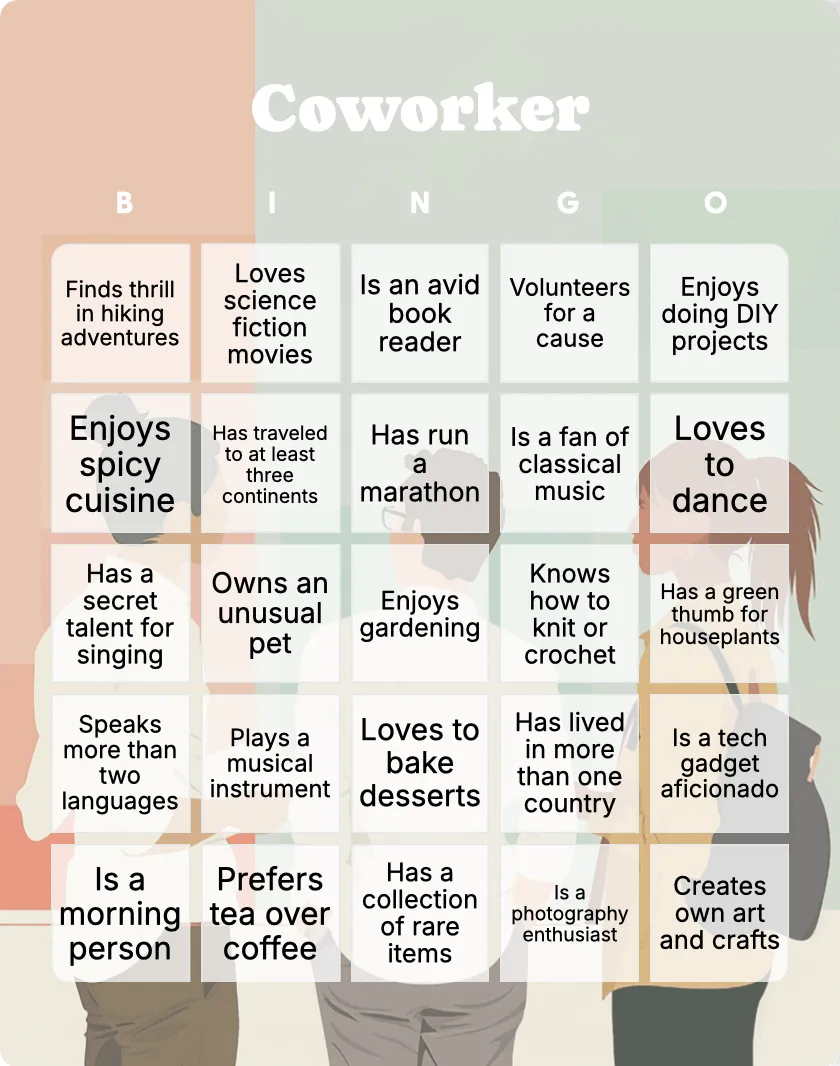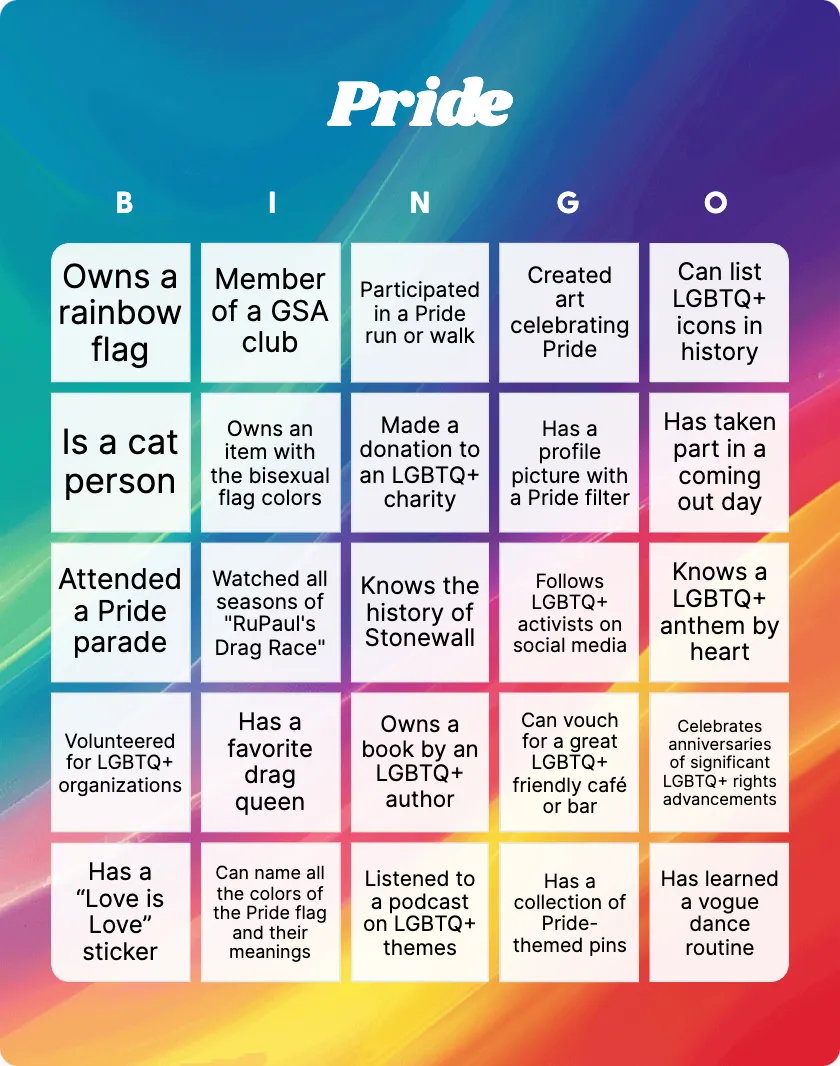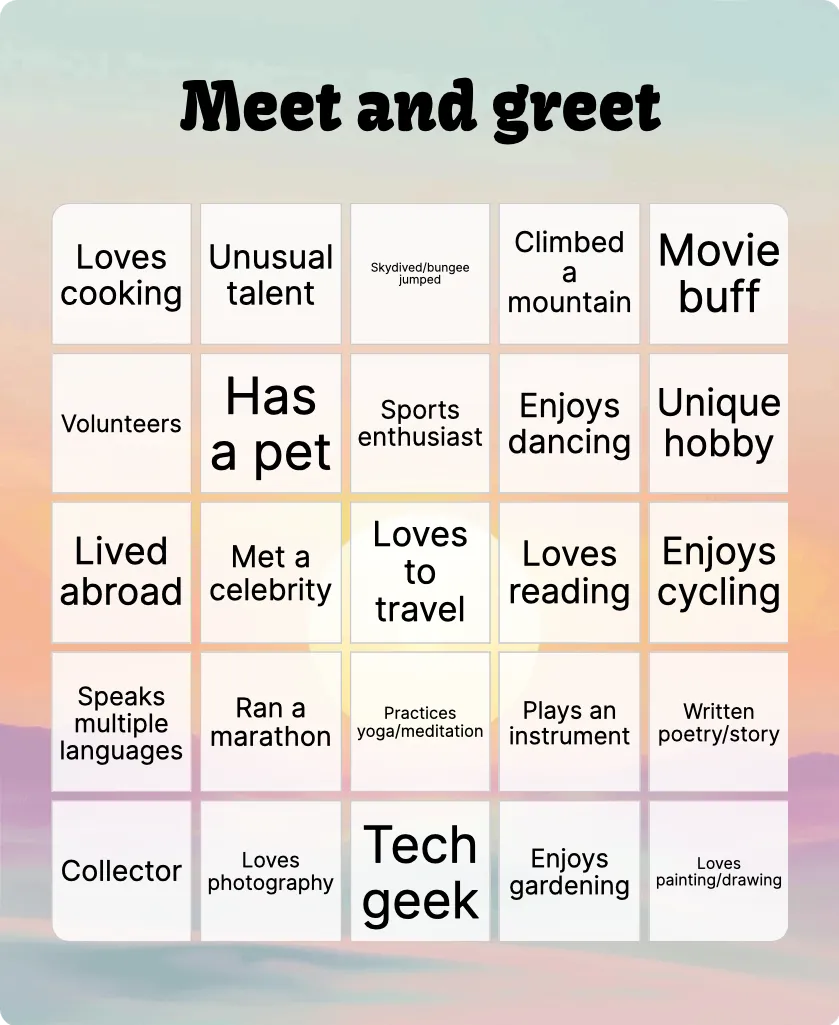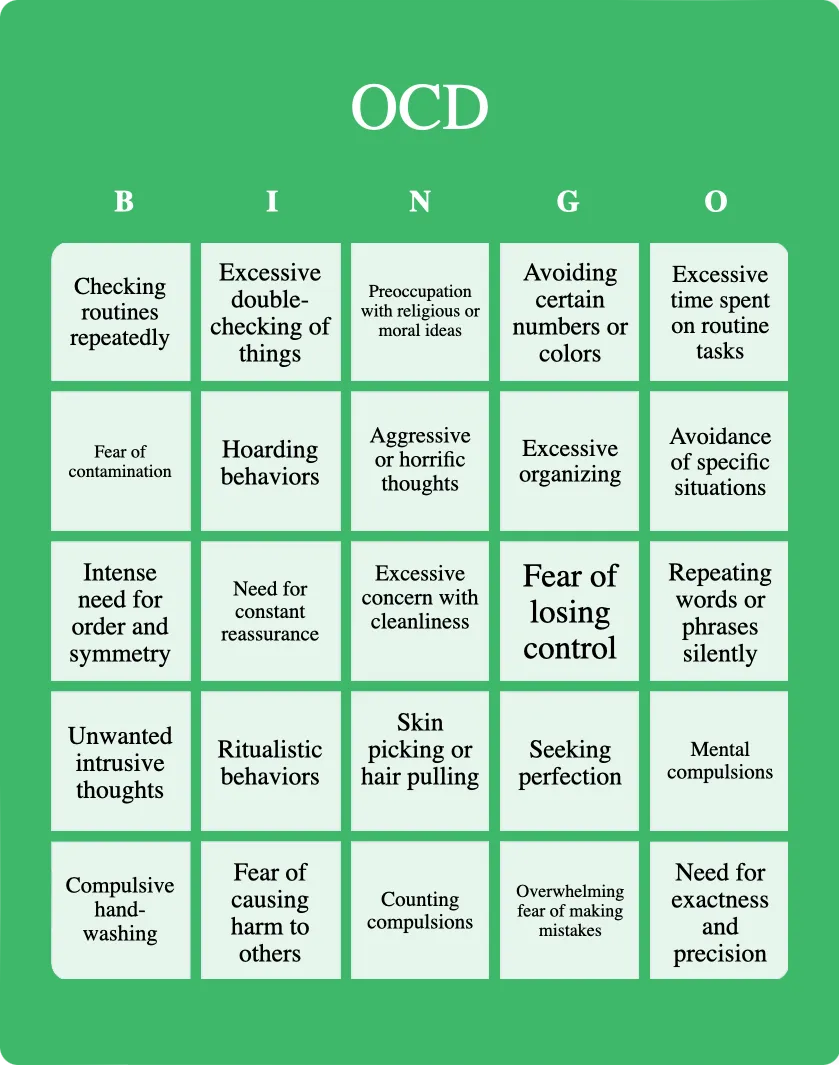
OCD bingo
- Unlimited printing
- Fully editable
- Play online
Explore understanding and empathy with our OCD Bingo. This interactive tool helps to illustrate the daily challenges faced by those living with Obsessive Compulsive Disorder in an engaging way.
Items in this card
25- Checking routines repeatedly
- Fear of contamination
- Intense need for order and symmetry
- Unwanted intrusive thoughts
- Compulsive hand-washing
- Excessive double-checking of things
- Hoarding behaviors
- Need for constant reassurance
- Ritualistic behaviors
- Fear of causing harm to others
- Preoccupation with religious or moral ideas
- Aggressive or horrific thoughts
- Excessive concern with cleanliness
- Skin picking or hair pulling
- Counting compulsions
- Avoiding certain numbers or colors
- Excessive organizing
- Fear of losing control
- Seeking perfection
- Overwhelming fear of making mistakes
- Excessive time spent on routine tasks
- Avoidance of specific situations
- Repeating words or phrases silently
- Mental compulsions
- Need for exactness and precision
More about this bingo card
OCD Bingo offers a thoughtful and empathetic approach to understanding Obsessive-Compulsive Disorder (OCD). This game serves as an educational tool to spread awareness and foster empathy, making it suitable for support groups, therapy sessions, or educational environments. Remember, the goal is to promote understanding and support, not to trivialize the experiences of those with OCD.
What is OCD?
Obsessive-Compulsive Disorder (OCD) is a mental health condition characterized by unwanted, intrusive thoughts (obsessions) and repetitive behaviors (compulsions). Understanding OCD is crucial for creating supportive environments and fostering empathy.
How to play OCD bingo

In support groups
- Prepare the cards: Distribute bingo cards featuring common OCD themes and behaviors, such as checking rituals, contamination fears, and symmetry obsessions. Ensure these representations are accurate and respectful.
- Discussion prompts: Utilize the cards to initiate conversations. For instance, when a specific theme like 'repeated checking' is marked, encourage participants to discuss how this behavior manifests in daily life and the challenges it presents.
- Empathy and understanding: Create a supportive atmosphere where group members feel comfortable sharing their experiences. Use the discussions to build empathy among members, helping them understand the diverse ways OCD affects individuals.
In therapy sessions
- Therapeutic tool: Incorporate the bingo cards as a non-intimidating way to help clients open up about their OCD symptoms. This can make it easier for them to articulate their experiences and identify specific challenges they face.
- Coping strategies: Each square on the bingo card can be a starting point to discuss effective coping mechanisms. For example, if a square related to 'excessive cleanliness' is marked, explore various strategies to manage this compulsion.
- Progress tracking: Use the game as a light-hearted method to track changes in symptoms or the effectiveness of therapeutic strategies over time, making the process of therapy more engaging and less daunting.
Educational settings
- Awareness and learning: Start by introducing the concept of OCD, its symptoms, and impacts. Use the bingo game to make this learning process more interactive and engaging.
- Interactive learning: Facilitate discussions around each square, debunking common myths and stereotypes about OCD. This can be a powerful way to educate students or participants about the realities of living with OCD.
- Inclusivity and support: Emphasize the importance of a supportive environment for individuals with OCD. Discuss how peers can contribute to creating an inclusive and understanding community.
Virtual play
- Digital distribution: Share digital versions of the bingo cards with participants, making the game accessible regardless of location.
- Online discussion: Conduct virtual sessions where each marked square becomes a topic for group discussion. This approach can be particularly beneficial for those who are more comfortable in an online setting.
- Virtual empathy: Ensure that the virtual platform is a safe space for sharing and learning. Encourage participants to be respectful and supportive in their interactions, fostering a sense of community and understanding online.
Top tips

Respecting experiences
- Empathetic language: Always use respectful and empathetic language when discussing OCD.
- Avoiding trivialization: Remember, this game is a tool for understanding, not for entertainment at the expense of others.
- Inclusive and supportive: Ensure that the game environment is safe, inclusive, and supportive for all participants.
Benefits of using Bingo Card Creator
- Customizable content: Tailor the bingo cards to suit the specific needs and experiences of your group.
- Adaptable format: Suitable for various settings, from support groups to educational environments.
- Digital and print options: Use digital cards for online sessions or print them for in-person meetings.
Ready to deepen your understanding?
OCD Bingo is more than just a game; it's a step towards greater awareness and empathy for those living with OCD. It's an innovative way to discuss, learn, and support each other in a safe and respectful environment. So, let's play, learn, and grow together in our understanding of OCD.

The Bingo Card Creator Team
We're the Bingo Card Creator Team, bringing you diverse, engaging bingo templates and content.

